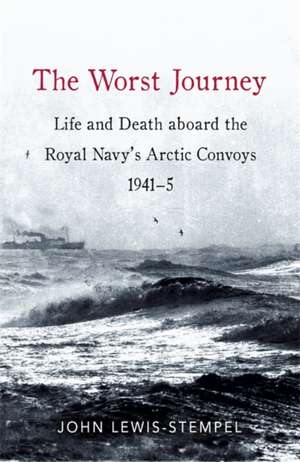The Worst Journey
Autor John Lewis-Stempelen Limba Engleză Hardback – 28 mar 2018
Accurate navigation was impossible because of the gyrations of the ships' compasses so far north and ships would plunge down the face of near-vertical waves or heel over almost onto their sides. In summer, long days offered no protection against aerial attack; and in the dark, U-boats would attack. A ship might fight off sixty attacks in the course of a single day. In summer, Oerlikon gunners would be at their guns for twenty hours a day; in the winter they often froze to death.
There were 'routine' injuries caused by the rolling and pitching of a ship throwing men down stairs and tearing machinery, ammunition and fittings loose. More than half the ships on the first 22 convoys to Russia had no rating or officer with any medical knowledge. Desperately ill or injured sailors would simply die.
If morphine was running low, 'minor' cases were given, in the style of Nelson's navy, a 'whacking tot' of rum before treatment. Sleep was pretty much impossible given the constant movement of the ships, and the foul, damp air below decks was a breeding ground for TB.
If men were forced to abandon ship, even in the summer they would survive for at most two minutes of being in the water, or they would be killed immediately by the shock of contact with the freezing water. If a ship did sink, very few if any men would survive, perhaps 43 out of 1,200 men in one case.
Even when the convoys reached Murmansk or Archangel there was no respite. Murmansk was about 25 miles from the front, which meant that there were enemy raids all day and food was short.
Despite all this the Royal Navy stuck to the convoys for four years, supplying Russia with planes, oil and other vital materiel, but, more importantly, by reassuring Stalin of Britain's commitment, the men of the Arctic convoys succeeded in keeping Russia in the war.
This is a book about the men of the convoys, about life aboard ship, drawing extensively on letters, diaries and reports, many from previously unpublished archives, as well as new interviews with the last surviving veterans.
Preț: 129.08 lei
Nou
Puncte Express: 194
Preț estimativ în valută:
24.71€ • 25.72$ • 20.34£
24.71€ • 25.72$ • 20.34£
Carte nepublicată încă
Doresc să fiu notificat când acest titlu va fi disponibil:
Se trimite...
Preluare comenzi: 021 569.72.76
Specificații
ISBN-13: 9781472137937
ISBN-10: 1472137930
Pagini: 288
Dimensiuni: 156 x 240 mm
Editura: Little Brown Book Group
ISBN-10: 1472137930
Pagini: 288
Dimensiuni: 156 x 240 mm
Editura: Little Brown Book Group
